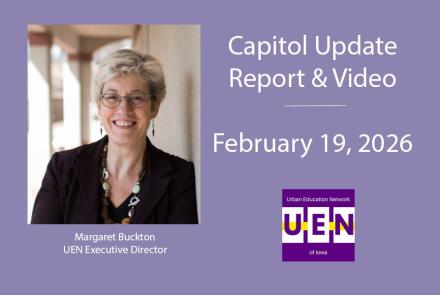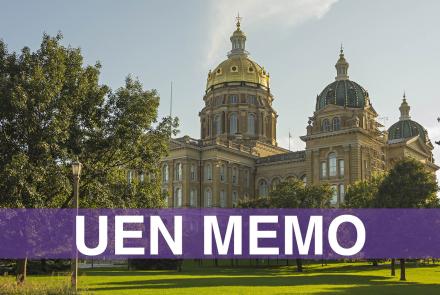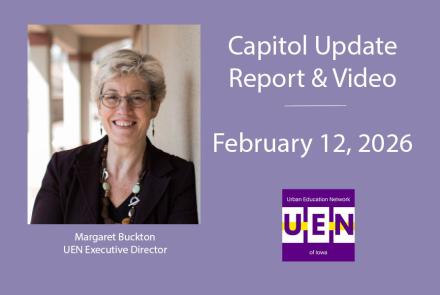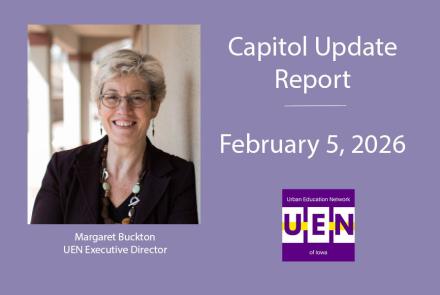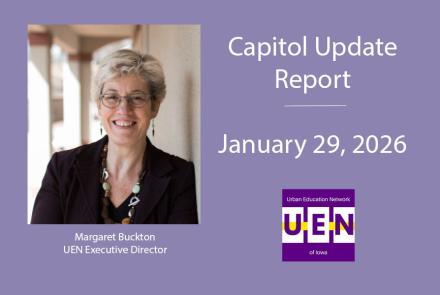Capitol Update - February 13, 2025
UEN Legislative Update
February 13, 2025
(Download this week's printable UEN Legislative Update and Bill Tracker)
This UEN Weekly Report from the 2025 Legislative Session includes:
- School Funding/SSA Movement in Both Chambers
- Governors Bill on Childcare Continuum and Preschool
- Governor’s Cell Phone Bill Subcommittee in the House
- Chronic Absenteeism Clean-up Bill on the Senate Calendar
- Advocacy Actions for the Week
- Bill Tracker Detailing Actions on Committees, Subcommittees & New Bills for the Week
School Funding / SSA Movement in Both Chambers
SF 167 SSA by the Senate, sets a 2% increase in the state supplementary assistance rate, SSA, which is the percentage increase in the state cost per pupil that funds schools through the Iowa School Foundation Formula. The bill continues property tax relief provisions and applies a 2% increase categorical funds. UEN opposed the Senate version since the UEN priority required an SSA level at least meeting the inflation rate (currently reported as 2.6% on the Iowa Employment Appeal Board’s chart of the CPI-U ceiling for arbitrator awards). The Senate approved the bill Tuesday, with Republican Sens. McClintock, Driscoll, and Shipley joining the Democrats in voting no. The bill was sent to the House.
The House Appropriations Committee approved HF 319, which set a slightly higher 2.25% SSA rate, adding $176 per student. The House proposal also includes several other investments:
- Increases the State Cost Per Pupil (SCPP) base by $10 to close the gap in SCPP and District Cost Per Pupil (DCPP), narrowing the current $140 difference to $130. For those districts above with higher DCPP, the $10 will provide property tax relief.
- Raises the Operational Sharing Cap from 21 to 25 pupils.
- Increases the Transportation Equity Fund, the total amount appropriated to make all equity aid payments to cover the shortfall to get to the statewide average.
- An additional supplement of $22,591,274 for use by school districts for any general fund purpose, considered as miscellaneous income. The funding is prorated per pupil to school districts and is effective for the July 1, 2025 through June 30, 2026 school year (one-time, not ongoing).
- Continues the Property Tax Replacement process.
A public hearing was held in the House on Thursday morning, with only a few speakers in person but hundreds of online comments about schools and students needing more. The House debated the bill on Thursday afternoon. In a procedural move, the HF 319 proposal was amended to match SF 167 at 2%, then the Senate’s bill as identical was substituted, then the House amended SF 167 to match their higher proposal of 2.25% plus the additional provisions. The bill was approved in the House, 58 yes, 35 no and 7 absent or not voting, returning SF 167 to the Senate as amended. The Senate had adjourned for the week, so they will first be able to consider the changes on Monday.
Next steps: The Senate could agree with the House changes, insist on their own 2% SSA, or find a compromise. Use this weekend to thank House members for a higher investment in public schools and encourage Senators to agree with the House’s action. See specific advocacy actions below. The 30-day statutory requirement to set SSA within 30 days of the Governor’s budget announcement is today, Feb. 13. They’ll be a little late, but hopefully not drag it out too long.
Governor’s Bill on Childcare Continuum and Preschool
HSB 145 was introduced in the House and assigned to the Health and Human Services Committee. The bill includes the following provisions:
Division I: Community-Based Provider Program (Preschool)
- Creates a “community-based provider program” for entities to directly provide Statewide Voluntary Preschool Program (SVPP) without partnering with public schools
- Goes into Iowa Code 256C, which requires High-Quality (certified teachers, at least 10 hours, quality standards, Gold assessment, etc.) we think – the numbering system is tricky, so we are verifying this is correct.
- Specifies that a community-based provider that partners with a school district’s approved program is not directly approved to have their own program.
- Requires state BOE to adopt rules to further define the process of demonstrating readiness to be a Community-Based Provider, participation in data collection and performance measures, and PD plan required for Community-Based Provider teachers.
- Requires DE to develop the application and selection process.
- Provides 0.5 weighting directly to Community-Based Providers based on eligible students enrolled and requires State BOE to determine by rule the date for counting initial year eligible students for Community-Based Provider PK budget
- Specifies that 0.5 weighting for public PK students is based on eligible enrollment (count from prior year) which is current law.
- Requires DE approval of compliance with accountability provisions and DE on-site review of Community-Based Provider’s implementation of PK programs.
Division II: Elimination of Child Development Coordinating Council
- Strikes the Child Development Coordinating Council (CDCC) and requires DE to take over their duties (includes encouraging all potential providers of SVPP to participate and processing grant requests for early childhood funding) and removes CDCC from the Center for Early Development Education.
- Removes parenting programs, including for birth-3 at-risk families from Early Childhood (transfers to the Department of Health and Human Services, or HHS).
- Strikes requirement for districts to appoint and advisory committee for each Family Support Program
- Strikes the requirement for DE to seek assistance from foundations and public and private agencies to evaluate programs and support school districts.
Division III: DE Responsibilities
- Review and research effective programs, including evidence-based or promising practices in preschools which shall including review of curricula and instructional materials used by PK programs in Iowa, PK programs serving students with IEPs and PK programs created in early childhood chapters.
- Develop and post list of most effective curriculum and materials.
- Develop a PK accountability system.
- Developmental and learning outcomes.
- Continuous implementation of high-quality program standards for school districts, nonpublic schools, programs serving students with IEPs and Community-Based Provider. Requires the system to use, at a minimum, data from child performance and growth measures (279.60), continuous improvement activities (256A and 256C) and other measures and activities defined by the DE.
- Develop, in coordination with HHS, an alignment of an outcomes-based accountability system for all PKs. Requires the system to take into account the voluntary quality rating system established in 237A.30 (Voluntary child care quality rating system).
- Review and revise state early learning standards related to PK programs serving students with IEPs.
- Provide PD to school districts, nonpublics, and Community-Based Provider offering PK programs to assist with implementing revised early learning standards, PK assessments, high-quality program standards, and standards related to PK programs.
Division IV Early Childhood Iowa
- Requires HHS to define geographic areas (for distribution and management of school-ready grants).
- Aligns with behavioral health regions rather than counties by Jan. 2026.
Division V Child Care Workforce: Child Care Assistance Eligibility
- Parent is employed at a child care facility or home that has an agreement with HHS to accept reimbursement from child care assistance program.
- Parent works a minimum of 32 hours per week in that program and is counted in the minimum child-to-staff ratio.
- If in a child care home, parent does not provide child care to their own child.
- Parent is not a substitute or an assistant.
- Based on HHS’s evaluation of the application for childcare assistance, the parent has a need for childcare.
- Parent is not the owner of the child care facility or child care home.
- Allows the facility to qualify for reimbursement.
- Requires copayments based on the parent’s household income for services received from the program.
- Requires HHS to adopt rules.
Division VI Child Care Continuum Partnership Grants – Pilot Program
- Requires HHS, in collaboration with ECI Area Boards and DE, to create and administer a child care continuum partnership grant pilot program.
- Competitive grants to partnerships between providers of SVPP and child care centers licensed under chapter 237A to provide full-day early childhood education and care.
- Requires HHS to adopt rules to administer the pilot program.
UEN is reviewing details before determining registration, but it’s fair to say we are disappointed that there is no clear path to full-day preschool for children from low-income families in this proposal.
Governor’s Cell Phone Subcommittee in the House
SSB 1065 and HSB 106 were introduced the week of Feb. 6 and assigned to their respective Education Committees. See the Feb. 6 report for policy details in these bills. This week, there was a subcommittee in the House to discuss the bill.
UEN explained our concerns with:
- The bill states that DE is to provide professional development and support to teachers for instruction in grades 6-8 about social media impacts on students. We requested the DE work through school district leaders who must allocate time, instructional materials and support for quality PD for the teachers in your district.
- Timelines are backward: DE should provide policy models, the Department of Public Safety and DE should provide guidance on changing emergency plans, State Board of Education should create administrative rules and standards for the social media content, all before school board are required to create board policies and change emergency preparedness plans.
UEN is registered as undecided but mostly concerned about the timelines or district authority over professional development and instruction. Legislators on the subcommittee seemed interested in fixing the timelines.
Chronic Absenteeism Clean-up approved by the Full Senate Education Committee
The Senate Education Committee approved SF 277, which fixes some issues with chronic absenteeism. The bill includes the following provisions:
- Directs DE to work with the County Attorneys Association to develop and distribute to county attorneys and school districts (and private schools, too) a model policy that county attorneys may reference when determining whether and to what extent to enforce truancy law.
- Expands exceptions to include military application, military service, funerals and weddings and requires board policy or rules to describe how the exceptions may be met by a student, and must include reasonable consideration for travel time.
- Removes the certified mail delivery of notice (allows many others)
- Changes the mandate for a school engagement meeting, when 15% of absences in the grading period trigger the mandated meeting, to only apply if the school official determines the child’s absences are negatively affecting the student’s academic progress.
Approved in Senate Education Committee, now on the Senate Calendar. UEN is registered in support.
UEN Advocacy Resources
Check out the 2025 Session Advocacy Handbook, which has everything advocacy beginners and experienced pros can use to advocate with legislators, at the statehouse or back in your district. Find the handbook on the UEN Advocacy Website here: https://www.uen-ia.org/advocacy-handbook
Advocacy Actions This Week:
Adequate School Funding: Contact legislators regarding SSA. The original SF 167, which sets an increase of 2.0%, falls short of inflation. SF 167 as amended by the House is a preferable policy and UEN is registered in support. The teacher salary investment last year was a really good start, but SSA has to keep pace or our staff and programs for students will be compromised. See the UEN Adequate Funding Issue Brief (link below) for additional information. Reach out to Senators and ask them to support the House amendment. Reach out to House members and thank them for investing more.
Additional Supports:
- Download the UEN 2025 Adequate School Funding Issue Brief, providing education funding history, comparing total Iowa education expenditures per pupil, which most recently ranked our state as 35th in the nation, now spending more than $2,000 per student LESS than the national average, and including some talking points to help you advocate with your legislators. UEN’s Legislative Priority supports an SSA rate that at least matches the inflation rate schools are experiencing.
- ISFIS New Authority Calculator allows users to set the SSA rate and calculate the impact for your district for FY 2026 on your regular program (not including special education or other supplemental weightings or categoricals). Enter the SSA percentage increase and you can compare to the new money you’d receive if the SSA rate matched inflation (either 2.9% for CPI and 3.2% for Core Inflation) compared to the Governor’s Recommendation of 2.0%.
Unfunded mandates and Implementation Timelines: remind legislators that any bill requiring staff training or rewriting curriculum costs districts time and money. Unfunded mandates such as the mandatory Civics Test and Career Education curriculum in middle school require resources that take away from math, literacy or other key issues of district focus. Each mandate should bring with it the funding to implement or at least an increase in SSA so school districts do not have to make tough choices. So many new requirements are on our curriculum directors' and teacher plates. State BOE has approved new standards (ELA, Science, Math) and the new literacy initiative is currently being implemented. Any additional mandates for changing instruction that require training need thoughtful time and compliance expectations. Recent examples include cell phone policy/social media instruction, adding career exposure, planning and experience to middle school grades, a new math initiative or civics initiative, seizure disorder training and plans, and the list goes on with every new bill.) Please stress the time it takes to do good work, to benefit students.
Connecting with Legislators: To call and leave a message at the Statehouse during the legislative session, the House switchboard operator number is 515.281.3221 and the Senate switchboard operator number is 515.281.3371. You can ask if they are available or leave a message for them to call you back. You can also ask them what’s the best way to contact them during session. They may prefer email or text message or phone call based on their personal preferences.
Find out who your legislators are through the interactive map or address search posted on the Legislative Website here: https://www.legis.iowa.gov/legislators/find
Other UEN Advocacy Resources:
Check out the UEN Website at www.uen-ia.org to find Issue Briefs, these UEN Weekly Update Reports and Videos, UEN Calls to Action when immediate advocacy action is required, testimony presented to the State Board of Education, the DE or any legislative committee or public hearing, and links to fiscal information that may inform your work. The latest legislative actions from the Statehouse will be posted at: www.uen-ia.org/blogs-list. The 2025 UEN Advocacy Handbook will be available and posted shortly.
Bill Action This Week
Check out our separate Bill Tracker for all the bill actions and details for the week.
Contact Us
Stay tuned for a thorough explanation of Statehouse actions this week.
Margaret Buckton
UEN Executive Director
margaret@iowaschoolfinance.com
515.201.3755 Cell
Thanks to our 2024-25 UEN Corporate Sponsors:
Special thank you to your UEN Corporate Sponsors for their support of UEN programs and services. Find information about how these organizations may help your district on the Corporate Sponsor page of the UEN website at www.uen-ia.org/uen-sponsors.
- Solution Tree - www.solutiontree.com/st-states/iowa


